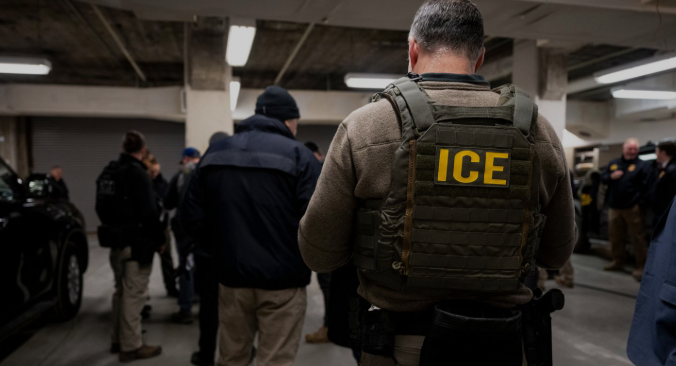In a deeply alarming development, Immigration and Customs Enforcement (ICE) agents have begun systematically targeting unaccompanied immigrant children across the country, seeking to either deport them or prosecute their adult sponsors, according to internal ICE documents and multiple sources familiar with the operations.
The Department of Homeland Security (DHS) has publicly characterized these efforts as “welfare checks,” claiming the goal is to ensure that vulnerable children, many of whom arrived at the U.S.–Mexico border alone, are not being trafficked or exploited. However, evidence obtained by the National Immigration Project paints a starkly different picture. Behind the scenes, ICE is not merely conducting wellness visits—it is actively gathering intelligence on children and their sponsors for immigration enforcement purposes and potential criminal prosecution.
These revelations have sparked widespread fear among immigrant communities and immigration advocates, who warn that the administration is engaging in a form of “backdoor family separation” under the pretense of child welfare.
Welfare Visits Masking Immigration Enforcement
According to an internal ICE document accessed by advocates and shared publicly, the agency’s visits are not limited to verifying the children’s safety. ICE officials are also evaluating whether the children are “flight risks” or pose alleged threats to public safety—an assessment that could lead directly to deportation proceedings.
As Michelle Méndez, Director of Legal Resources and Training at the National Immigration Project, put it:
“This isn’t about child welfare. The true goal is the criminalization of children and their families. It’s an insidious backdoor method to separate families.”
Adding to the concern, ICE is targeting children based on vague allegations of gang affiliations, often without substantial evidence. This echoes prior Trump-era practices of labeling immigrant youth as security threats without due process, frequently using flimsy or unreliable information to justify deportations under the controversial Alien Enemies Act of 1798.
Early Stages of a Larger Crackdown
The enforcement operations appear to be in their early stages but are rapidly expanding. Two divisions within ICE—Enforcement and Removal Operations (ERO) and Homeland Security Investigations (HSI)—are coordinating efforts to track down unaccompanied minors (referred to internally as “UACs” or “Unaccompanied Alien Children”) and, where possible, initiate deportations or criminal proceedings.
According to ICE’s own documents:
“ERO officers should remember they are to enforce final orders of removal where possible, and HSI will pursue criminal options for UACs who have committed crimes.”
In reality, immigration experts warn, even minor infractions or unsubstantiated claims could be used as grounds for deportation or prosecution under these aggressive new policies.
Climate of Fear and Trauma
The human toll is already evident. In Washington State, ICE agents recently conducted a so-called welfare check on a 16-year-old girl. Terrified, the minor contacted her attorney in tears, fearing her life would be “flipped upside down.” Immigration advocates stress that this is not an isolated case but part of a growing trend that is traumatizing already vulnerable children.
As Becky Wolozin, a senior attorney at the National Center for Youth Law, stated:
“It is difficult to reconcile the government’s stated intentions with the terror and trauma these operations are inflicting on children and families.”
Experts point out that while some instances of trafficking among unaccompanied minors do occur, they are rare. Most children are safely placed with relatives or vetted sponsors, a process overseen by the Office of Refugee Resettlement (ORR), an agency within the Department of Health and Human Services that traditionally operated independently of immigration enforcement.
However, under the Trump administration’s renewed tenure, this separation between child welfare and immigration enforcement is collapsing. ORR is once again sharing sensitive data on immigrant children and their sponsors with ICE—reigniting fears of mass arrests and deportations.
Legal Services Slashed, Data Sharing Expanded
In another troubling development, the administration has cut legal aid funding for unaccompanied minors, despite court interventions urging the restoration of those critical services. Simultaneously, the administration has reinstated the controversial Trump-era policy of sharing sponsor background information with ICE, potentially exposing undocumented sponsors to arrest and deportation.
The new acting head of ORR, Angie Salazar, is a former ICE agent, raising further concerns that child welfare services are being subordinated to immigration enforcement priorities.
“I worry deeply about the trauma being inflicted on these kids,” said Shaina Aber, Executive Director of the Acacia Center for Justice. “The amount of fear the government is willing to inflict on immigrant families is staggering.”
Conclusion
The administration’s aggressive targeting of unaccompanied immigrant children—under the guise of “protecting” them—represents a profound threat to due process, child welfare, and basic human rights. Experts, attorneys, and advocates are sounding the alarm: this is not about safety. It is about using vulnerable children as pawns in a broader crackdown on immigrant communities.
The American people must pay attention. The stakes for vulnerable children—and for the nation’s moral integrity—could not be higher.



